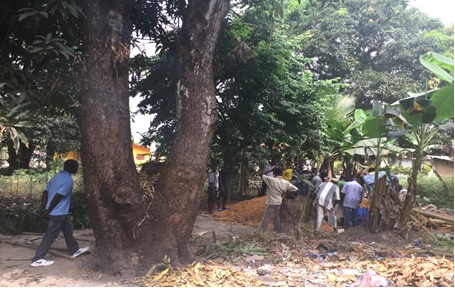
The operations of the defunct London Mining PLC in Lunsar have left residents of Chindatta Village with bad feelings with regards the bulldozing of their ancestral graveyard without due process and without any regard for the dead.
Chindatta village happened to be one of the communities affected by the operations of the company, and residents now consider themselves as being most affected as they no longer have the privilege of paying homage to their ancestors and loved ones who were buried at the said graveyard. Pouring of libation on the graveside of relatives has been an important annual event from time immemorial, and this is exactly what indigenes of the village have been deprived of as a result.

The company in its quest to embark on rapid production of iron ore, went into Chindatta community, clearing both old and new graves and reburied the bodies exhumed into a single giant pit.
The pit itself can no longer be identified because the company went ahead and dumped massive waste materials including boulders on top of it and across the entire cemetery, thereby leaving the community without a graveyard.
Residents of the village are therefore left with no option but to bury their dead in their backyards, which before now was not allowed for health and safety reasons.
In a rather sad mood, Fatmata Sesay, one of the aggrieved residents of the village whose younger sister and other family members were buried at the said graveyard and who also happens to be the Vice Chairlady of the advocacy group Women on Mining and Extractives, recalled that “London Mining exhumed and subsequently deposited the remains of our family members and loved ones in a mass grave which was covered by a huge pile of waste and that the place has become a no-go area”.
This she said does not make sense to her and other family members because as she puts it, the community has nothing to show for the mining ac
tivities in their locality, except for a water well which the company constructed.
She went on to state that the community has no health center and other basic facilities, and that the company deceived them by taking stock of their plantations and properties with the impression that they were going to be relocated and duly compensated.

“We had expected that the authorities would have otherwise exhumed the remains of our family members and have them relocated alongside the inhabitants of the village to an ideal location asn leaving us in the same locality will have far-reaching negative health implications on us in the long run”, she said.
It is unclear how many people were buried at the affected graveside as there seems to be no official record available at the village. It is also not certain whether such information will be available at the Port Loko District Council, under whose administrative authority the village falls.
The Paramount Chief of Marampa Chiefdom, Port Loko District, Bai Koblo Queen II, said rather than burying at their backyard, residents of Chindatta village should take their dead ones to a nearby village for burial.
“We have placed a ban on residents burying in their backyards, and anyone caught in such an act would be dealt with severely”, he said.
This demand by PC Koblo Queen has been flatly rejected by the villagers for obvious reasons, including the fact that they cannot afford the cost of taking corpses to a nearby village each time somebody dies. According to them, the villages are situated far apart.
The people are particularly displeased that land owning families within the community were getting surface rent from the company, which does not imply that the company will have the audacity of tampering with the graveyard which belonged to the community and not to individuals.
Chindatta village happens to be one among the 16 villages that the then London Mining Company was supposed to have relocated so as to enable residents adapt to a normal life in a new and safe environment and providing them with necessary facilities in line with best international practice.
The villagers are therefore urging relevant authorities and stakeholders to ensure that in future, mining companies operating in their communities do so in compliance with their environmental impact assessment study and at the same time, honour their corporate social responsibility.
The situation at the village is worrisome as residents expressed concern that the huge pile of waste left behind by the company does not only constantly remind them about the degrading manner in which the bodies of their ancestors and loved ones were manhandled, but also aggravates flooding during the raining season.
“We are worried that this pile of waste is still here, and nothing seems to be done by the authorities concerned”, said an aggrieved resident who went on to state that “We also don’t know what the new mining company is planning to do with the waste”.
What has become the major issue is who takes responsibility for the situation now that London Mining has ran into administration and folded up operations and unfortunately could not get reactions from them.
Timis Corporation which took over from London Mining seemed not to have taken over the liabilities left behind, and therefore did nothing to the effect. This is the predicament in which the people of Chindatta have found themselves and so far, no one seems to be paying any attention to that.
Meanwhile, efforts to get a reaction from the National Minerals Agency, (NMA) which is the regulatory body of all mining companies in the country, proved futile. The NMA stands accused of neglecting its duty to effectively monitor the operations of companies to ensure that they work within acceptable standards including preserving gravesides and sacred bushes.
This story was a collaboration with New Narratives as part of the Excellence in Extractives Reporting Project. Funding was provided by German Development Cooperation. The funder had no say in the story’s content.
